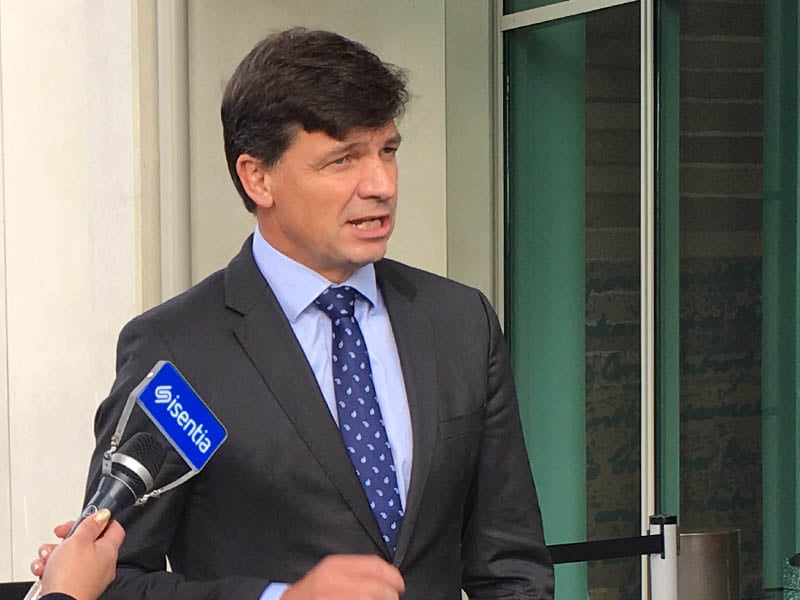The Digital Transformation Agency’s $70 million in additional funding includes a substantially expanded cyber security remit and the creation of centralised platform services to complement its governance and standards-setting role.
Speaking to InnovationAus.com after the delivery of Scott Morrison’s second budget on Tuesday night, Assistant Minister for Cities and Digital Transformation Angus Taylor said the new money enables the next phase of the government’s transformation agenda.
There are three streams to the new funding.

An additional $10.6 million will allow the DTA to build a cyber security governance capability, to hire in a crack team of cyber experts into its Digital Investment Management Office, which carries a veto stick over all substantial tech projects to ensure they are in line with the whole of government agenda.
Funding of 33.6 million from the APS Modernisation Fund will underwrite the DTA building whole of government platforms, including a single platform payment system; a simplified citizen notification system for handling digital communications; a long awaited ‘Tell Us Once’ service that automatically updates citizen details across government agencies; and the delivery of the second stage of GovPass, the federated identity platform.
Thirdly, $13.9 million has been allocated to building digital capability across the public service. This new money builds on the original DTO 1.0 remit to help attract, build and retain digital skills across the Commonwealth, developing in-house digital leadership skills and creating digital training standards.
The projects are not new and the funding not unexpected. But the new money does underscore a renewal of the Turnbull Government’s commitment to the path it undertook when it restructured its transformation efforts into the DTA late last year.
It is a steady-as-she-goes budget boost that will be welcomed by the industry, and should give newly-appointed DTA chief executive Gavin Slater – appointed from a group executive role early last month – confidence that her has the political muscle to get on with the job.
It also clarifies that the DTA is not just a governance and advice agency, and that it has a substantial whole of government service delivery role as well.
The addition of cyber governance is of course most interesting. Cyber is a priority of all governments, but it has become a hallmark of the Malcolm Turnbull’s, and the DTA now has a role to play, joining the Attorney General’s department and all its intelligence and law enforcement agencies, as well as Defence, and Prime Minister and Cabinet, and even DFAT who play roles.
“A crucial component of all government (ICT) projects now is cyber security,” Mr Taylor told InnovationAus.com.
“And so there needs to be a small but very capable team within the DTA to look at these projects and to advise on them, and to advise the digital transformation committee of the Cabinet and relevant ministers.”
“We have to ensure than we are nailing these very important cyber issues. It is a relatively small function at $10.6 million over four years,” he said.
“But we have to get cyber right at each level of the process (or project approval) and that’s exactly what this team is doing.”
Mr Taylor confirmed that the DTA has been working with CSIRO data capability unit Data61 on cyber issues, but said it also draws in capability wherever necessary, including from the Australian Sugnals Directorate.
“You rope in whatever agencies are necessary to get the advice right,” he said.
One project that is absolutely fundamental to the success of the whole-of-government digital transformation agenda is GovPass – the publicity-shy federated identity system that the DTA expects to launch as a beta in 2018.
“This is absolutely crucial. It is a fundamental project,” Mr Taylor said. “(A lack of robust) Digital identity has been a barrier to better digital government in many ways, but it has to be done right.”
Mr Taylor said the GovPass model would be “consensually-driven” (citizens will have to opt-in). It will avoid the creation of identity honeypots (irresistible repositories of saleable goods for hackers), but it will also have to “enable the linking of datasets where appropriate.”
“We know there is a big prize for both citizens and for governments in getting this right,” Mr Taylor said. The benefit is not just to government in streamlining the delivery of services, but to businesses and citizens in reduced cost in dealing with government.
As a platform service delivered across government, “this is where the DTA is delivering a service, not just providing advice or setting standards.”
The “Tell Us Once” is a no-brainer that has been a much talked about no-brainer for ten years. But it may actually become a reality – where you can tell one department you’ve moved house or changed your phone number and it will update across the government. Longer term this miracle may even update across private sector repositories like your bank account or utility provider.
The simplified payments platform delivers just that. An easy way to make payments to government – for whatever it is – but also to make it easier and vastly cheaper for the many hundreds of government services to take payments via a government-owned platform service.
This is the same as the notification service. Literally this is nothing more than a central platform that many different departments and agencies can use to provide a standardised and efficient means of communicating with client/citizens.
“In combination these platforms are very significant reforms,” Mr Taylor said.
“They have the potential to substantially improve our interactions with citizens, and to substantially improve the performance of government.”
He said the $70 million boost to the DTA was a substantial increase, both in funding and in the responsibilities of the agency.
“But it’s a central function. I don’t want it to be bloated, I want it to be focused on the essential projects.”
Do you know more? Contact James Riley via Email.

